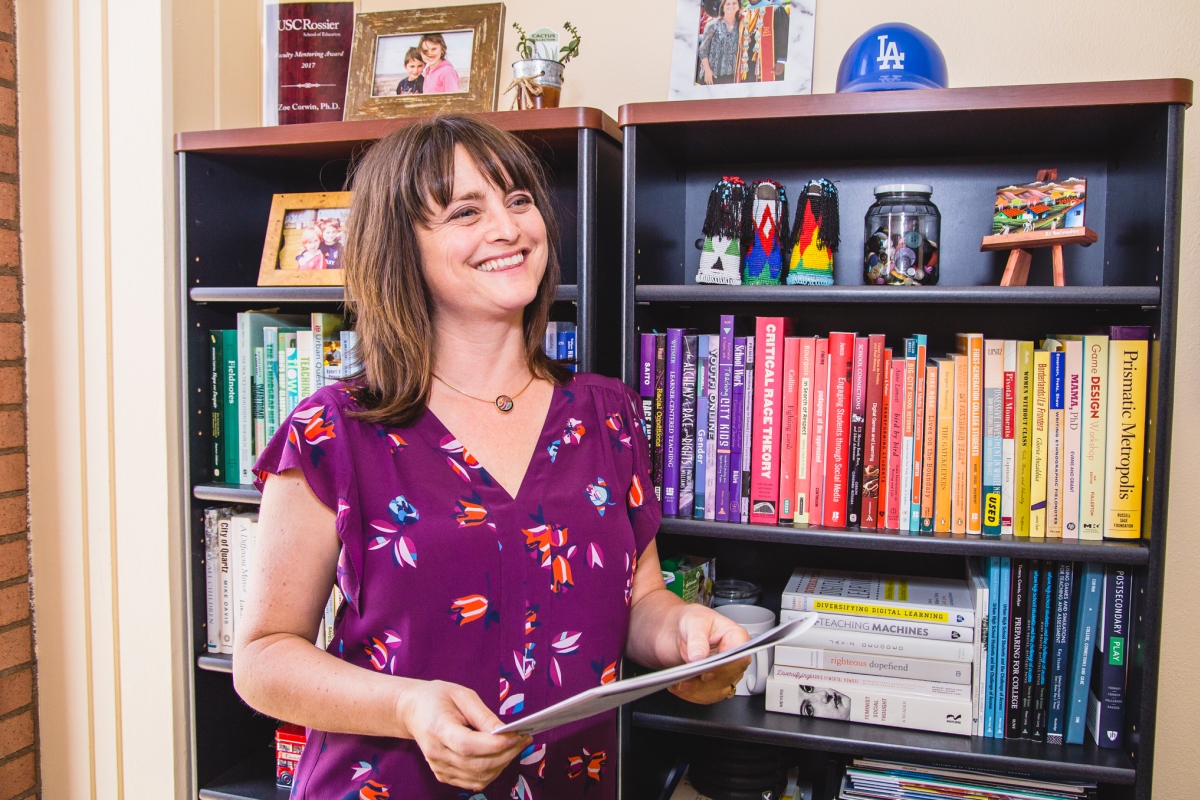
Zoë B. Corwin: Learning More than Tricks from Skateboarders
A year ago, I invited colleagues from across USC to collaborate on an interdisciplinary participatory action research study to explore the intersection of skateboarding, mental wellness, and community. We called the study Mattering in the Margins because we wanted to highlight the complex and wonderful ways that skaters thrive despite regularly being stigmatized and pushed to the margins of educational and community settings. When we embarked on the study – in the midst of the pandemic, constrained by Zoom – none of us could have imagined just how much the study would grow to matter to us as individuals and as a research community. In Why this Study Matters, several members of our research team – from senior scholars to newly-minted skater/researchers – share their reflections on why the study has value to them.
It is strange, I recognize, to read about a skateboarding study in the Pullias Center newsletter. At first glance, the connection to higher education seems weak. And yet it is our hope that the study will be useful to the field of higher education. We are learning about how young people are navigating social isolation and forging community in spaces that don’t always feel welcoming. We are exploring ways that passion and commitment coalesce or clash with educational, career and social pathways. We are listening closely to how young people from diverse racial, gender, class, and skate identities have learned to communicate and connect across difference. We have ample data for practitioners in college admissions to illustrate that skaters are absolutely the kind of creative, tenacious, collaborative students we’d be well-served to admit into undergraduate and graduate programs.
We are also experimenting with a new model of interdisciplinary research that is infused with creativity and empathy. From our experience with the first study, Beyond the Board, Dr. Neftalie Williams and I knew that the skaters would have a tremendous amount to teach us – lessons that we knew would have ramifications for academic and public audiences. Our current research team includes faculty from USC’s Rossier School of Education, Annenberg School for Communication and Journalism, Suzanne Dwork-Peck School of Social Work and the School of Dramatic Arts, plus the University of Nevada, Las Vegas’ College of Education – along with 18 Los Angeles-area skater/researchers between the ages of 18-30. We are using storytelling techniques such as documentary filmmaking and photovoice where participants document and reflect on their communities’ strengths and concerns in order to gain an understanding of the mental health challenges faced and healing strategies employed by skateboarders. Participants process lessons learned in the field during a live Zoom session, guided by Theatre of the Oppressed liberatory practices.
Our skater/researcher colleagues captivate us each week with short video or photography compilations that touch on study themes such as Dan’s clip about how friends made through skateboarding positively affect her mental state; Ethan’s reflection on gratitude that takes viewers back to his elementary school and emphasizes the value of taking initiative and nurturing the spaces one inhabits; Edwin’s clip that touches on his role as a mentor in the skateboard community; and Emma’s piece about the potential of skateboarding to help people get outside and take care of themselves. I am deeply grateful to the skater/researcher participants and to my colleagues for journeying with me over the last few months on this project.
In July we’ll be releasing study findings. Deliverables from the first study include a podcast and a zine – efforts to connect with diverse audiences in ways that resonate with their interests and media preferences. Please follow @uscskatestudy on Instagram for updates.
On behalf of the Pullias Center, I wish you a rejuvenating summer. It’s a great time to skate…